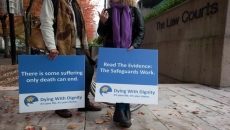OTTAWA - A new study from the Finance Department suggests that single parents, lower-income households and recent immigrants are more likely to lose more for extra earnings than most other groups of workers.
Also more likely to lose out from extra earnings through working more hours or getting a higher-paying job were workers who live in Quebec, and those between the ages of 35 and 44.
In some instances, the federal analysis found that those groups of workers were more likely to see 50 per cent or more of their earnings offset by higher taxes, a clawback in benefits, or a combination of the two.
Women were more likely than men to lose out on 60 per cent or more of their extra earnings, which the recently released analysis chalks up to their slightly greater reliance on federal supports.
Katherine Scott, a senior economist with the Canadian Centre for Policy Alternatives, says the study lends credence to calls from anti-poverty advocates and businesses for a broad review of the tax system.
She said a review is necessary because the tax system was designed in the past and doesn't fully capture the economy as it is currently structured, which creates difficult choices about working more, but not netting much more income.
"This is the way the system works. You're caught against the rock and a hard place," Scott said.
On average, workers lost $341 for every $1,000 increase in their earnings, based on the 2017 data the paper relied on.
Of that amount, about $146 was linked to higher federal income tax payments, $23 to a decline in federal benefits like the income-tested Canada Child Benefit, and $45 from payroll taxes.
The rest was a combination of provincial taxes and benefits.
The people dinged hardest were those earning between $24,739 and $33,724, who, on average, lost about $413 for every $1,000 in additional earnings. That average was just above the loss for the top 10 per cent of income earners.
The study said the proportion of low-income workers who lost out on 50 per cent or more of their extra earnings was double the proportion of workers in the country's top income bracket.
Not being much better off or faring financially worse after a boost in earnings could make workers think twice about taking on more hours or could lead others to stay out of the job market altogether.
A large share of the population facing the possibility of losing half or more of their extra earnings could also be "an impediment to the success of policies aimed at increasing labour supply," the Finance Department wrote in the study.
Understanding how the interaction of higher taxes and decreased benefits impacts workers' decisions has been bureaucrats' focus for years to reduce disincentives to work.
In theory, these "marginal effective tax rates," as they're known, can show policy-makers a path to prod people to work more, but that doesn't necessarily translate into real-world results, said Garima Talwar Kapoor, policy and research director at Maytree, an anti-poverty think-tank.
"Policy-makers want to think that people think about these things, but it's actually not how people make life decisions," she said. "There are lots of other factors."
She pointed to drops in the number of women working during the pandemic that were often linked to the availability of child care, rather than whether working more was going to make them lose out on child benefits.
That's why Talwar Kapoor said policy-makers should look for ways to help lower-income workers in particular maintain benefits while also boosting their labour market attachment.






